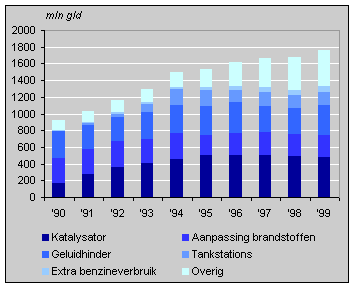Anti-pollution measures for traffic cost 800 million euro a year

Measures to reduce the burden imposed on the environment by motorised traffic cost nearly 800 million euro in 1999. Most of these costs, for example those for catalytic converters, were borne by vehicle owners. The increase in the volume of traffic and the wide range of measures to reduce the pollution it causes have doubled the costs of environmental traffic measures between 1990 and 1999.
Costs of environmental traffic measures

The Dutch government has introduced measures like legislation, subsidies and own initiatives in an attempt to reduce the pollution caused by motorised traffic. Many of the legal measures are based on European regulations. These make it compulsory to adapt vehicles and fuels to make them cleaner. Catalytic converters for petrol engines, for example, cost 226 million euro in 1999. In the course of the years, the costs of catalytic converters have accounted for a quarter of the costs of measures to reduce pollution by traffic. Improvements in fuels (such as the development of unleaded petrol) cost about 120 million euro.
As a catalytic converter of a petrol engine works best when the engine is tuned to run less economically than it can do, the engine does use more fuel. In 1999 this extra fuel cost a total 34 million euro.
Measures to reduce traffic noise in 1999 cost nearly 160 million euro, 82 million of which was paid by the government. Government measures comprise things like insulation of homes and the construction of noise barriers. The adaptation of vehicles is paid for by vehicle owners.
Environmental costs of traffic also include costs to prevent or clean up soil pollution at petrol stations. These costs amounted to 71 million euro in 1999.
Cor van Bruggen